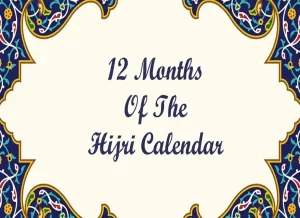Rules of Fasting – Fasting, or Sawm, is a central pillar of Islam, observed during the holy month of Ramadan and on other occasions. It’s a time for spiritual growth, self-discipline, and empathy for those less fortunate. While the core essence of fasting remains the same, there are specific rules and guidelines governing its practice.
Abstinence:
- Food and Drink: From dawn to dusk, Muslims abstain from all food and drink, including water. Even chewing gum or swallowing unintentional amounts of water can invalidate the fast.
- Sexual Relations: Marital relations are prohibited during fasting hours.
- Smoking and Intoxicants: Smoking and consuming any intoxicants, including alcohol and drugs, are forbidden while fasting.
- Sinful Activities: Fasting extends beyond physical abstention to encompass moral conduct. Avoiding gossip, lies, anger, and other sinful acts is crucial.
Exemptions:
- Children: Individuals who haven’t reached puberty are not obligated to fast.
- Elderly and Ill: Those experiencing physical or mental illness are exempt from fasting, with the possibility of making up missed days later.
- Pregnant and Breastfeeding Women: Pregnant and breastfeeding women are exempt due to the increased nutritional needs of themselves and their children.
- Travelers: Travelers may delay their fasts until they reach their destination and resume at a later time.
Additional Practices:
- Suhoor and Iftar: Muslims are encouraged to have a pre-dawn meal (Suhoor) and break their fast at sunset with a meal called Iftar. These meals should be moderate and mindful.
- Quran and Prayer: Increased engagement with the Quran and prayer is highly encouraged during Ramadan.
- Charity and Good Deeds: Focusing on acts of charity and kindness towards others is an integral part of Ramadan and fasting.
Remember:
- These are general guidelines, and specific rulings may vary depending on individual circumstances and interpretations within different schools of Islamic thought.
- Consulting a religious scholar or qualified Imam is encouraged if you have any specific questions or concerns regarding fasting.
- The intention behind fasting is crucial. It’s a journey of self-improvement, spiritual growth, and connection with God, not just physical deprivation.
By understanding and adhering to the rules of fasting, Muslims can enrich their spiritual experience and fulfill this important pillar of their faith.
Islamic Legal Rules of Fasting
1 What is Sawm?
2 The Purpose of Fasting
3 Fasting Is Obligatory
4Fasting Rules
What is Sawm?
In the Quran, “sawm” is the Arabic word for fasting. The word sawm means to abstain. Mary, the mother of Jesus, said in Chapter Maryam that she had vowed to fast for the sake Of Allah Merciful. So, today, I will not speak with anyone. [Quran 19:26]. Shariyah defines the word “sawm” as abstaining from everything forbidden from dawn until sunset.
The Purpose of Fasting
In chapter 2, verse 183, the Quran states, “O you believers, fasting has been prescribed for you just as it had been prescribed for the people who came before you so that you can learn taqwa” (piety).
Taqwa is an essential spiritual and moral term in the Quran—the sum of all Islamic ethics and spirituality. Taqwa is the quality of a believer that makes them constantly aware of God.
Taqwa is the desire to do good and avoid evil to please God. Taqwa means holiness, righteousness, and God-consciousness. Taqwa is a matter of patience and perseverance. Fasting is a great way to develop patience.
According to the Prophet (SA), fasting is a protective shield. Fasting protects one from lustful desire and sin. Jesus was asked by his disciples how to get rid of evil spirits. He replied, “But these kinds never come out except through prayer and fasting.” (Matthew 17:21).
According to Al Ghazali, fasting can produce a semblance (or a feeling) of freedom from desire in a person. Imam Ibn Al Qayyim believed fasting was a way to free the human spirit from desire and allow moderation in the carnal mind. Imam Shah Waliullah Dahlawi (d. 1762 C.E.) Fasting was viewed as a way to weaken the animalistic and strengthen the angelic aspects of human beings. Maulana Mawdudi (d. 1979 C.E.) Maulana Mawdudi (d. 1979 C.E.)
Also Read: Ramadan Information & Ramadan For Kids

It Is Required to Fast
As mentioned in the verse [Al-Baqarah 2:83], Muslims were instructed to fast every year in Ramadan, the second year after Hijrah. The Quran also says, “The month Ramadan was the one in which the Quran was revealed. It contains guidance for humanity and clear signs of distinction and guidance.” Anyone who witnesses Ramadan must fast …” (Al-Baqarah 2:84).
Prophet Muhammad (SA) explained this in more detail in a few of his Hadith books. According to Imam Al-Bukhari and Imam Muslim, the Messenger said on Ibn Umar’s authority: “Islam is built on five pillars.
These are testifying there is no other god but God, and Muhammad is His Messenger, performing prayer and paying the zakah, making the pilgrimage ( Hajj), and fasting during Ramadan.
All Muslims agree that fasting during Ramadan is mandatory for physically capable people.
Also Read: The Holy Month of Ramadan Blessings
Rules for Fasting
Who Must Fast?
Ramadan is an event that Muslims around the world look forward to because it brings inner peace and happiness.
Every adult Muslim male or female who has reached puberty and is healthy, as well as those who are not sick or on a trip, must fast during the month of Ramadan.
A temporary illness is one that a person hopes to recover from soon. This person must not fast on sick days, but they should fast after Ramadan to make up for the missed days. If you are suffering from an incurable illness and do not expect to improve your health soon, then you are allowed to skip fasting.
However, they are required to pay the Fidyah, which is equivalent to giving a person in need a full day’s meal for every fast missed. You can give money instead of food to someone in need. Women who are menstruating or have post-natal bleeding cannot fast.
They must complete the fast after Ramadan. Women who are pregnant or nursing their babies may also delay fasting until a later date.
Shariah defines travel as any journey of at least 48 miles (80 kilometers) from your city. The trip must have a purpose. Avoid traveling for no reason during Ramadan, as this will cause you to miss your Fast. Travel plans should be changed to allow for fasting during Ramadan. Travelers who miss the Ramadan fasts must make them up as soon after Ramadan as possible.
Fasting, according to the Sunnah
1 – Take sahur (pre-dawn meal). Sahur is Sunnah, and it is blessed. It is best to take sahur in the last 30 minutes before dawn or at the time of Fajr.
Iftar (breakfast) is best taken immediately after sunset. Shariah defines sunset as the moment the sun’s disk disappears below the horizon.
3 – Abstain from false words and actions during the Fast. Avoid arguing, having disputes, using bad words, or doing anything prohibited. In addition to gaining physical fitness and discipline, you should also discipline yourself morally and ethically. It is also important to not show off your fasting by talking about it too much, showing a dry mouth, a hungry stomach, or a bad mood. Fasting people should be pleasant and cheerful.
4 – Increase your reading and worship of the Quran and charity during the Fast. Everyone should read the entire Quran once or twice during Ramadan.
Also Read: Printable Ramadan Mubarak Worksheet Download
Things that invalidate the Fast
Avoid doing anything that could invalidate your Fast. The following things can invalidate your Fast and make you need to qadar (make up for the days missed):
1 – Intentionally eating, drinking, or smoking, including consuming non-nutritional items through the mouth or nose.
2 – Intentionally making yourself vomit.
Even in the final moments before sunset, menstrual bleeding or post-childbirth bruising can begin.
4 – Intercourses or other sexual contacts (or masturbation), which result in ejaculation in men or vaginal secretions in women (orgasm).
5. Eating, drinking sm, smoking, or engaging in sexual activity after Fajr, on the mistaken belief that it’s not yet Fajr. These acts can also be performed before Maghrib, assuming it’s already Maghrib.
Sexual intercourse during fasting is forbidden. It is not permitted to engage in sexual relations during fasting. Imam Abu Hanifah says that eating or drinking during a fast is punishable by qadar and haftarah.
Things that do not invalidate fasting
Fasting is not invalidated by using a miswak for teeth cleaning
During the Fast, you are allowed to do:
Take a shower or bath. Involuntarily swallowing water will not invalidate a fast. Most jurists agree that swimming is allowed during a fast, but diving should be avoided because it will cause water to enter the stomach from the nose or mouth.
Use of perfumes, contact lenses, or eye drops.
3 – Injecting or taking a blood test.
Use miswak or toothbrushes (even those with toothpaste), and rinse the nose or mouth with water.
5 – Unintentionally eating, drinking, or smoking, i.e., forgetting to fast. One must continue to fast as soon as one remembers.
6 – A wet dream or sleeping during the day does not mean that one has broken their Fast. If one had intercourse in the night but was unable to bathe before dawn, they can start fasting and then make ghusl at a later time. If a woman’s menstruation ceases at night, she can begin fasting without having made ghusl. In these cases, ghusl (bath) is required, but fasting is still valid without bathing.
If you want to keep your fast, it is okay to kiss your spouse. However, you should avoid doing anything else that is prohibited.
Fasting Requirements
Fasting has two essential components:
The intent (niyyah), is for fasting. Every day, before sunrise, one should express a sincere desire to fast in the name of God. It is not necessary to tell the intention in words.
The intention must come from the heart and the mind. Some jurists believe the intention does not need to be repeated daily but can only be made for the entire month. To get the full benefits of fasting, it is better to make an intention each day.
2 – Avoid: Avoid all things incompatible with fasting, as described above.
Dr. Muzammil Siddiqi, former president of the Islamic Society of North America and imam of the Islamic Society of Orange County in California, USA, is also the director of the Islamic Society of Orange County’s Director.
Our Latest Ramazan Articles:
- Ramazan Apps You Must Have
- How To Enjoy Ramadan With Menstruation?
- Ramazan Increases Women’s Responsibility
- 5 Beautiful Ramadan Duas Every Muslim Should Know
- Ramadan Supplications: Qualities Of A True Servant
- Ramadan Mubarak: Hear Greetings in Different Languages
- Ramazan Healthy Recipes To Open And Close Your Fast With
- 7 Heart Warming Duas To Celebrate The End of Ramadan 2024
- What is The Celebrate Ramadan? Here are 5 Unique Traditions
- Ramadan Recipes For Kids: A Collection Of Fun Kid-Friendly Recipes
- Ramazan Begins With Varied Fasting Hours Across The World Wide
- Select 7 Heart Warming Duas To Celebrate The End of Ramadan 2024
- Fasting Begins on Thursday in Saudi Arabia Despite There Being No Ramazan Moon








